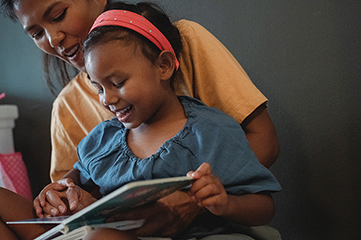In this age of screens and technology, reading and storytime is sometimes overlooked. Reading regularly with your little one is a wonderful way to mindfully connect with your child, work on receptive and expressive language skills, and develop early literacy skills. Studies have shown that reading to your child daily will have lasting positive effects on language, literacy, and academic skills. It is important to cultivate a positive relationship with reading from a young age to ensure reading is seen as a pleasurable task rather than a chore.
Here are some simple ways to encourage a love of reading in your preschooler:
1. Build books and reading into your daily routine
Incorporating books into your daily life promote the “habit” of reading. Bedtime, naptime, quiet time, and snuggle time are a great start!
2. Make reading interactive
Reading the words on the page is a great start, but be sure to incorporate lots of questions, observations, and predictions into storytime. If your child has a favorite book they have read many times, give them a chance to tell the story by describing pictures!

3. Incorporate the child’s interests and give choices
Choose books that focus on your child’s most beloved activities, objects, and characters. Let your child choose the book they would like to read. Gaining autonomy and control over what they are reading will help with motivation and engagement.
4. Connect books to real life
Help your child make connections between the book you are reading and his or her personal life. Read books about your child’s favorite movie or TV show. Talk about common animals, objects, actions, or events that you see both in the book and in the world around you. Example: “That puppy looks like Grandpa’s dog!”, “I remember when you were feeling silly like that character.”
5. Make reading a positive experience
Create a positive effect around books and reading. Reading is a great time to give your child the connection and one-on-one time with you that they crave. Some families find success in making a cozy and enticing designated reading space. Fill storytime with lots of encouragement and affirmation so that your child feels successful in his or her attempts. Get silly with character voices and sound effects. Show your own excitement about reading and your child will mirror it!

6. Make books easily accessible to your child
Place books around the house in locations where your child can access them. Allow books and reading to be an option during free time. Be sure to praise your child when you see them engaging with a book!
7. Set an example
Children watch and learn from what we adults do and say. A great way to encourage your child to be a book lover is to become one yourself! Big brothers, sisters, and friends are great examples as well.
Remember, have fun! Reading should be a treat, not a punishment. Be sure to check out some of Blue Bird Day’s social stories and Cozy Corner reading time to help incorporate reading into your child’s daily routine.
Resources:
Coates, C., Weisleder, A., Dreyer, B., Johnson, M., Seery, A., Canfield, C., … & Alan, L. (2017). Early Reading Matters: Long-term Impacts of Shared Bookreading with In-fants and Toddlers on Language and Literacy Outcomes”. Unpublished, Pediatrics, NYU School of Medicine.

Blue Bird Day fosters socialization, sensory regulation, and pre-academic learning in children ages 2-7 years in therapeutic rotations that simulate preschool and kindergarten settings. Our compassionate therapists practice a relationship-based and family-centered approach, provide parent training, and collaborate on goals and individualized intensive treatment plans for your child.
We believe in a collaborative and multi-disciplinary team approach to therapy. A team of occupational therapists, speech-language pathologists, dietitians, developmental therapists, behavioral therapists, physical therapists, and therapeutic assistants are created for each child to ensure child and family are fully supported and the best possible results are achieved.
Options for individualized, group and virtual therapy sessions are available as well.
Want to learn more or you have a specific question? Feel free to connect with us here!



